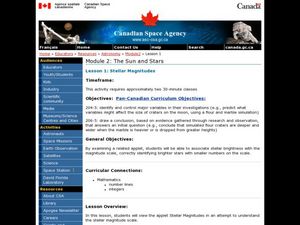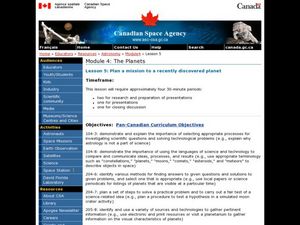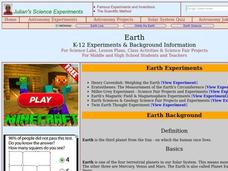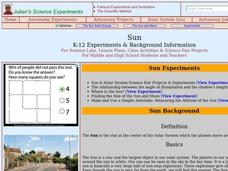Curated OER
Stellar Magnitudes
Students analyze the stellar magnitude scale. In this stellar magnitude lesson, students examine the stellar magnitude scale. Students predict the Sun's magnitude from various planets.
Curated OER
The amazing and Beautiful Aurora
Pupils research the aurora. In this aurora lesson, students participate in a webquest about the aurora. Webquest worksheet is included.
Curated OER
The Amazing and Beautiful Aurora
Students create an oil pastel painting. In this pastel painting lesson plan, students examine images of the aurora borealis. Students produce an original pastel painting of the aurora.
Curated OER
The Phases of the Moon
Students sketch the different phases of the moon after exploring them on an internet program. In this moon phases lesson plan, students discuss how the Sun, Earth, and Moon are related.
Curated OER
Solar and Lunar Eclipses
Young scholars examine eclipses. In this eclipse lesson, students investigate solar and lunar eclipses. Young scholars complete a WebQuest and write a descriptive summary of eclipses. Lesson references a WebQuest, but does not include a...
Curated OER
Tides
Young scholars discover how the position of the Sun, Moon and Earth affect tides. In this science lesson, students view a presentation about the tides. Young scholars discuss the different types of tides.
Curated OER
Planet Interiors
Young scholars compare and contrast the Earth's interior with 2 other planets by looking at images on the computer. For this planet interiors lesson plan, students write a paper about their findings.
Curated OER
Your Weight on Other Planets
Students explore their weight on other planets. For this science lesson, students view a presentation about the other planets and complete a worksheet in which they make predictions about their weight on the moon and other planets.
Curated OER
SETI WebQuest and the Drake Equation
Learners complete a WebQuest where they research the Internet for extraterrestrial intelligence. In this extraterrestrial lesson plan, students also explore how the Drake Equation can predict the occurrence of life elsewhere.
Curated OER
Plan a Mission to Recently Discovered Planet
Young scholars plan a mission to a recently discovered planet. In this science lesson plan, students research spacecraft design, distances in space, long-term missions in space, and life-sustaining planets. Young scholars work in groups...
Curated OER
The Milky Way and Beyond
Students consider the scale of the Milky Way Galaxy. In this Milky Way lesson plan, students hypothesize the length of time necessary to cross the Milky Way.
Curated OER
Hubble Space Telescope Webquest
Young scholars research the Hubble Space Telescope. In this Hubble Space Telescope instructional activity, students complete a webquest about the Hubble Space Telescope.
Curated OER
Scale Model of the Solar System
Students explore the size of the planets. In this science instructional activity, students create a scale model of the solar system. Students determine a scaling factor and calculate the size of their planets. Students create a scale...
Curated OER
Asteroids
Students examine the different types of asteroids and how they enter the atmosphere. In this space lesson students use mashed potatoes to create an asteroid they can eat.
Curated OER
Cosmic Rays
Students study cosmic rays and the energy behind them. In this atmospheric lesson students complete a cosmic ray telescope project.
Curated OER
Earth
Students study the earth in relation to the solar system. In this planetary lesson plan students complete several investigations into the measurement of the earth and its magnetic field.
Curated OER
Meteors
Learners identify the different types of meteorite using an interactive website. In this earth science lesson, students simulate how meteors crash on a surface. They relate meteor size to crater size.
Curated OER
Sun
Learners study how the sun is at the center of the solar system. In this solar lesson students measure the altitude of the sun and its size.
Curated OER
Sundials
Students investigate the different types of sundials and their history. In this shadows and time of day lesson students build their own sundials.
Curated OER
Why is the Sky Blue?
Students explore diffusion or scattering of light. For this physics lesson, students explain why the sky is blue and sunsets/sunrises are red.
Curated OER
Colors of Stars
Students observe the colors found in the flame of a burning candle and examine the basic concepts of matter and energy. Students apply this information to the color's of starts and the temperature of the stars photosphere. Students...
Curated OER
Bubble-ology
Learners observe the visible spectrum while observing light hitting the surface of bubbles. They blow large bubbles and observe how the colors change.
Curated OER
Lotto or Life: What Are the Chances?
Though the website does not seem to have the mentioned video, a reding and lottery style games simulate the chances of finding intelligent life somewhere other than Earth. Without the video, this lesson is short, but it can be a useful...
Curated OER
Tasty Constellations
Students conduct research on a constellation and create a model of it using marshmallows as stars. They draw the constellation in pencil on black paper, glue on marshmallows, and trace the pencil with chalk to connect the stars.
Other popular searches
- Astronomy and Space Science
- Astronomy Vocabulary
- Planets and Astronomy
- Astronomy Activity
- Science Astronomy
- Ancient Astronomy
- Astronomy Lesson Plans
- History of Astronomy
- Space Science Astronomy
- Space and Astronomy
- Astronomy Navigation
- Astronomy History

























